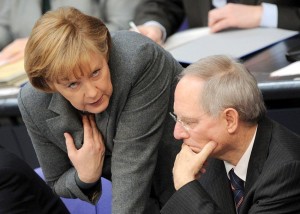Merkollande and… the Growth Pact!
Apr 26th, 2012 by admin
With France likely to vote in a socialist president critical of her fiscal pact, and a Dutch government collapsing on the issue of social reforms, German Chancellor Angela Merkel’s austerity model has less chance to be useful for Europe. The French incumbent becomes steadily less attractive as a partner for Ms. Merkel.
European Central Bank President Mario Draghi embarked on the theme by saying euro-zone nations needed a “growth pact” to complement their existing agreements to enforce fiscal discipline, saying nothing that suggested he would support loosening budget restrictions.
The emphasis on growth comes amid increasing evidence that fiscal retrenchment in the euro zone is hurting growth and putting more pressure on governments and established political parties as far afield as Spain, France and the Netherlands, where the government collapsed over a budget dispute.
Is Europe on the move in social aria? Yes. The extreme right is on the rise again in France, where the Front National, whose image has been detoxified by the daughter of its founder, Marie le Pen got its highest score.
Now Mr. Sarkozy, who is known in Germany as a divider and a polarizer, has every interest in dramatizing the choice before the French electorate in the next two weeks to have a chance to win the second round.
He has to win for the sake of austerity plan. But will not be enough. The car needs a growth pact to get the support of the electorate.
Opinion in the Germany leading elite on Hollande’s 60-point program of reform is divided. The former finance minister, Peer Steinbrück, have called Hollande’s demand for a renegotiation of the austerity pact naive.
Mr. Hollande, giving his first news conference after topping Sunday’s first-round vote, said if he were to be elected he would send a memorandum to European leaders explaining his plans for infusing more growth policies into Europe.
Merkozy “austerity” pact is like an electric car (brand new and immature technologies) and the car is about to lose some participants. Conservative or technocratic leaders of austerity are all fighting to keep this car on the road. Poor handling is making Spain, Italy, Portugal and Greece and they are considered sick passengers. Even co-drivers like the Dutch, who railed against a short haircut for Greece’s private financiers, are finding it hard to steer in the Netherlands, where the roads are smoother and you find any corner power supply. And so the Dutch government collapsed.
What is the next moment?
Angela Merkel is racing against time to lock the austerity measures into EU law, institutions, and its executive, the politics of key member states are moving in the opposite direction.
Whether it is from the extremes or the center, left or right, the popular message is similar: German-led austerity diminishes our sovereignty, wrecks the prospects for our youth, and – if anyone from the center to the left is talking – fuels the rise of the radicals right.
A new car could be possible on stage? Should we call: Merkollande? If it emerges, is a concept, most probable, for a family… wagon!
Merkel will move with the prevailing wind and she want majority in her country and she will fight for this. She is the most powerful politician in Europe.
Which is the message today? Persist with an economic program that diminishes sovereignty, consigns young peoples to high levels of unemployment, and steers Europe towards a decade of stagnation, and it will destroy trust in social solidarity, the bedrock on which the EU lies.
Anyone serious about the European project should take this message and analyze it. We need austerity but we need a growth pact to move forward too.
Advertisement:
The collapse of the European Union is a realistic scenario because member states are reclaiming power, xenophobia is on the rise and so are calls to reintroduce border controls, European Parliament President Martin Schulz said April 26.
The past few months have seen governments and leaders making more unilateral decisions and debating and deciding behind closed doors, in disregard of the Community method, Schulz said.
He said: the Commission and Parliament needs to cooperate more closely and defend the Community method with determination.


